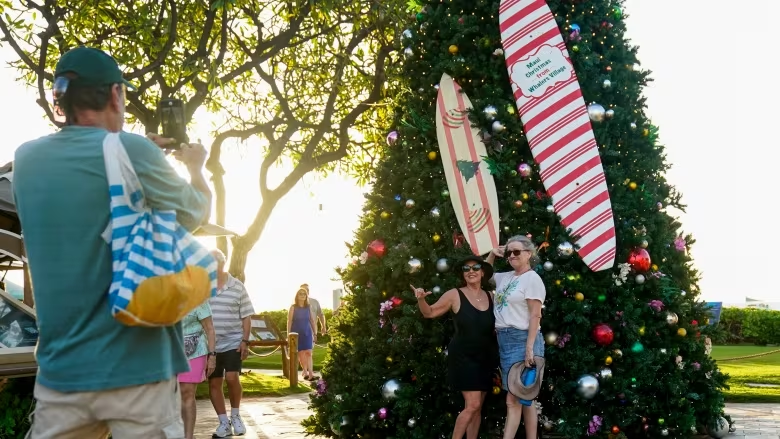
Individuals take a photo in front of a Christmas tree situated at Whalers Village shopping mall on Kaanapali Beach, Lahaina, Hawaii, on December 6. There are conflicting emotions among residents and survivors still grappling with the repercussions of the August wildfires as tourists gradually make a return to the west side of Maui. The image was captured by Lindsey Wasson for The Associated Press.
In the aftermath of the devastating wildfire that engulfed Lahaina, Hawaii, this summer, Katie Austin, a server at a local restaurant, faced the harsh reality of rebuilding her life. The restaurant where she worked succumbed to the flames, leaving her jobless. Two months later, as life in nearby beach resorts began to regain a semblance of normalcy, Austin found employment at a different eatery. However, the constant barrage of questions from diners, probing into the impact of the fire on her life, proved emotionally draining.
Hawaii's governor and the mayor of West Maui extended an invitation to tourists to return, hoping for an economic boost as the year-end holidays approached. However, for many residents, rejoining an industry that demands attentiveness and hospitality amid personal losses proved challenging. While parts of Maui, such as the upscale resorts in Wailea, eagerly welcomed tourists, west Maui faced more complex issues. Lahaina remained a debris-laden area, restricted to residents as efforts to clear toxic remnants progressed slowly.
The lack of long-term affordable housing for wildfire evacuees became a focal point of tension. Protests, including round-the-clock encampments on a popular tourist beach at Kaanapali, expressed frustration over the slow progress in providing stable housing options. Hotels in the area, housing thousands of evacuees, faced the delicate task of balancing the needs of displaced residents with the desire to bring back tourists.
For workers like Katie Austin, who found herself serving drinks to tourists while friends left the island due to housing challenges, the emotional toll was evident. The tourism industry, reliant on tips, placed servers in uncomfortable positions when faced with intrusive questions. Despite signs urging customer sensitivity, the inquiries persisted, prompting Austin to seek a new path, advocating for housing through a non-profit organization.
Erin Kelley, a bartender laid off since the fire, grappled with mixed feelings. While acknowledging the need for residents to have stable housing before welcoming tourists, she recognized the industry's importance for local employment.
As West Maui reopens to visitors, the dilemma of balancing economic recovery with the trauma experienced by the community becomes a broader concern. Climate change-driven disasters may necessitate a shift in tourism planning, with suggestions like promoting "voluntourism" to aid affected communities.
The impact of confusing messages in national and social media is evident in a 20% decrease in visitation to Maui from December 2022. Lisa Paulson, executive director of the Maui Hotel and Lodging Association, attributes this to a lack of understanding of the island's geography and alternative places to visit outside West Maui.
Amid these challenges, visitors are urged to approach the island with compassion and empathy. The Prechel couple from Phoenix, Arizona, exemplifies this by choosing to keep their reservations in Kihei, south of Lahaina while respecting the local community's recent trauma. Their conscious approach underscores the delicate balance required as Maui navigates the intersection of recovery and tourism.















